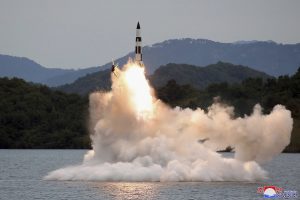Mitch Shin

Korean Central News Agency (KCNA), one of North Korea’s main state-controlled media outlets, reported on Thursday that the country had test-fired two long-range strategic cruise missiles.
Kim Jong Un, the supreme leader of the North, guided the test-launch on Wednesday, KCNA reported. It also reported that the missiles successfully hit the target 2,000 kilometers away in the western waters of the country and proved “the correctness, technical advantages and actual war efficiency of the overall weapon system.”
The South Korean military did not release a public alert about the North’s test on Wednesday, and the U.S. and Japanese militaries also have not released any statement on this test yet. North Korean cruise missile launches, unlike its ballistic missile launches, are not a violation of U.N. Security Council resolutions.
KCNA reported that the long-range “strategic” cruise missiles are deployed within “the units of the Korean People’s Army for the operation of tactical nukes” and the test “was aimed at further enhancing the combat efficiency and might of the long-range cruise missiles.”
According to a KCNA report on Monday, the spate of missile launches from September 25 to October 9 were staged by “tactical nuclear operations units” of the KPA. Kim guided the missile launches, including one ballistic missile launched from “a silo under a reservoir” in the Taecheon area in North Pyongan province on September 25, demonstrating its capabilities to invade the detection and interception efforts of South Korea-U.S. military assets. However, experts have raised questions over the operational capabilities demonstrated by the reservoir-launched missile, since it is impossible to launch from a reservoir in winter if it freezes. South Korean military downplayed the missile as well, saying that it is the North’s “last resort” to evade the South Korea-U.S. surveillance.
“We should continue to expand the operational sphere of the nuclear strategic armed forces to resolutely deter any crucial military crisis and war crisis at any time and completely take the initiative in it,” Kim was quoted as saying in the KCNA report on Thursday. Kim called the Thursday’s test-fire “another clear warning to the enemies and the practical verification and clear demonstration of the absolute reliability and combat capacity of our state’s war deterrent.”
He added, “We should focus all efforts on the endless and accelerating development of the national nuclear combat armed forces.”
As the escalations on the Korean Peninsula increase with the North’s nuclear and missile threats, more and more experts and politicians have raised the call for South Korea to also pursue nuclear capability, under the idea of matching “nuclear power to nuclear power.” This prospect, once nearly unthinkable, has received more public support in South Korea as North Korea’s nuclear capabilities grow. A poll from February 2022 found 71 percent of South Koreans in favor of their country developing its own nuclear weapons.
South Korean President Yoon Suk-yeol has not ruled out the possibility of his country moving forward to pursue nuclear arms. However, the United States is unlikely to authorize the deployment of U.S. tactical nuclear weapons in South Korea, much less approve of Seoul developing its own nuclear weapons.
No comments:
Post a Comment